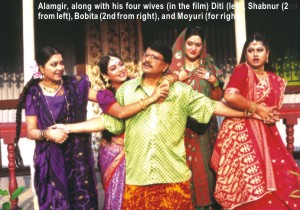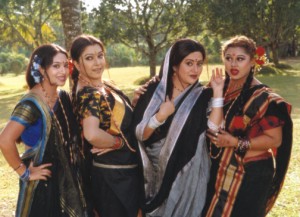|
Cinema
Char
Sotiner Ghar
Nargis' latest venture brings a social
malice like polygamy to the fore
Shamim
Ahsan
Bangladeshi
films are not held in high esteem. Educated and sophisticated
people consciously avoid going to the cinema and watch Bangladeshi
movies. Allegations abound that these films are vulgar and
have no plausible story line or artistic merit. But there
have been people within the industry who have dared to deviate
from the mainstream and make good films. Nargis Akhter is
one of them.
 Her
films are not what we call parallel films. Hers are not the
kind of films filmmakers like Tanvir Mukammel, Morshedul Islam
or Tareque Masud (some of the branded parallel filmmakers
of the country) have made. Rather, her films are mainstream
films with a difference. They have all the basic components
of the conventional commercial films like romance, songs,
dance, comedy, etc, and the cast too is made up of mainstream
performers. But what makes her films different is they have
"something to say"; Nargis uses the cinema as a
medium to communicate her messages to the masses. Her films
are educative, but they are not very serious, didactic or
intellectually profound as educative films intend to be. "My
objective is to educate through entertainment" is how
she brands her kind of films. Her first film "Meghla
Akash" starring Indian superstar Shabana Azmi among others
was meant for creating awareness about AIDS. A strong sense
of social commitment is evident in her second effort "Char
Sotiner Ghar" that was released on the Eid ul Azha. It
depicts the social malice of polygamy that is often sustained
and nourished by ignorance, prejudice and social taboo. Her
films are not what we call parallel films. Hers are not the
kind of films filmmakers like Tanvir Mukammel, Morshedul Islam
or Tareque Masud (some of the branded parallel filmmakers
of the country) have made. Rather, her films are mainstream
films with a difference. They have all the basic components
of the conventional commercial films like romance, songs,
dance, comedy, etc, and the cast too is made up of mainstream
performers. But what makes her films different is they have
"something to say"; Nargis uses the cinema as a
medium to communicate her messages to the masses. Her films
are educative, but they are not very serious, didactic or
intellectually profound as educative films intend to be. "My
objective is to educate through entertainment" is how
she brands her kind of films. Her first film "Meghla
Akash" starring Indian superstar Shabana Azmi among others
was meant for creating awareness about AIDS. A strong sense
of social commitment is evident in her second effort "Char
Sotiner Ghar" that was released on the Eid ul Azha. It
depicts the social malice of polygamy that is often sustained
and nourished by ignorance, prejudice and social taboo.
Set in
a remote village, the story evolves around Kashem Khan. Khan
is the richest man in the village and has three wives. The
story begins with the 50- plus Khan getting preparing for
his fourth marriage. His three wives could not bear him any
children, to be more specific, a son who would keep his generation
going. So, he is marrying again and his new find is Phulbanu,
a beautiful woman of the same village, who is less than half
his age. Phulbanu's father, as anyone can guess, is very poor,
has got kidney trouble and above all, has a couple of more
daughters to marry off. Khan's proposal appears to him like
a god-sent solution to all his problems. Phulbanu too cannot
ignore the fact that her sacrifice will not only ensure her
father's treatment, but ease his worry of marrying her two
daughters. She sadly submits to her fate.
Khan,
however, finds it hard to exert his dominance over his fourth
wife as he used to with his first three wives. When he tells
her about his long cherished desire of having a son, she blatantly
tells him about her impression about it -- she believes that
he is incapable of giving birth to any child. Khan reacts
angrily at first, but when the eldest wife, whose opinion
he attaches some value to, finds the suggestion reasonable,
Khan accepts the challenge. They visit a doctor and the youngest
wife's doubt proves right. Khan's heart caves in, he confesses
that he has made a great mistake by marrying one after another
in the hope of having a son.
At this
point in the movie, he divorces Phulbanu so that she can start
her life anew. Before her marriage, Phulbanu had some weakness
for the boatman of the same village. The weakness deepened
when they met each other a few times after her marriage. So,
the moment she gets divorced from Khan she runs to the boatman.
He also
extends the same offer to his first two wives when he returns
home broken and helpless. They, however, don't want to leave
him. The third wife, who had already devoloped an illicit
love affair with Kallu, a servant who lived in the same house,
has meanwhile committed suicide when she becomes pregnant.
 The
story is not particularly extraordinary. Neither in reel nor
in real life. It is the same old story of the richest man
in the village who takes advantage of the helplessness of
poor fathers with marriageable daughters. The
story is not particularly extraordinary. Neither in reel nor
in real life. It is the same old story of the richest man
in the village who takes advantage of the helplessness of
poor fathers with marriageable daughters.
But a
poor father's problems with many marriageable daughters is
not the focal point of the film. In "Char Sotiner Ghar",
Nargis goes beyond that. She deals with the ignorance and
misconception many of us hold concerning sex or birth related
issues. These issues are still taboo in our largely conservative
rural society. Taboos breed prejudice and ignorance and there
are unscrupulous individuals who readily take advantage of
that ignorance to pursue their own designs. Nargis tries to
attack the notion created and sustained by our patriarchal
society that the woman is the solely responsible for her inability
to give birth. In this story, it is Khan, the male, who is
incapable, but by the time the revelation is made all his
four wives have paid dearly.
The third
wife's illicit love affair with a male servant and the subsequent
tragic end of her life also illuminate another extreme predicament.
The movie tries to show how long-held misconceptions may lead
to unforeseeable tragedies.
 "Char
Sotiner Ghar" is reasonably well made. Alamgir in the
role of Khan and Shabnur as the youngest wife have done well.
The role of the first and second wife is very small and not
very significant and in the end, one has the feeling that
the talent of Babita and Diti was greatly wasted. Perhaps
commercial concerns prompted Nargis to cast them, which of
course is not a great sin. TV famed Mahfuz has portrayed the
boatman's character very well. Nargis apparently has great
weakness for music. Especially her use of songs to create
the tragic ambience has been an effective technique. "Char
Sotiner Ghar" is reasonably well made. Alamgir in the
role of Khan and Shabnur as the youngest wife have done well.
The role of the first and second wife is very small and not
very significant and in the end, one has the feeling that
the talent of Babita and Diti was greatly wasted. Perhaps
commercial concerns prompted Nargis to cast them, which of
course is not a great sin. TV famed Mahfuz has portrayed the
boatman's character very well. Nargis apparently has great
weakness for music. Especially her use of songs to create
the tragic ambience has been an effective technique.
The film
will hopefully win audience's acclaim as well as make good
money. Her first film "Meghla Akash" did reasonably
well at the box office and Nargis is confident "Char
Sotiner Ghar" will do the same. "I strongly believe
that good films fare well at the box office," she says.
Let's hope her confidence doesn't backfire.
Copyright (R)
thedailystar.net 2004
| 